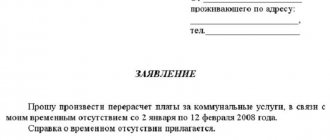Shared ownership: features of the relationship between co-owners
In Russian legislation there are two definitions of property – common and shared.
Joint ownership means the fact of simultaneous ownership of one property by several persons. This can happen for many reasons, for example, if several people buy one apartment together or they inherit living space. Property can be divided not only between relatives and spouses, but also between persons who are not related by family ties.
Shared ownership means this type of common property (apartment, house, room), in which the shares of all co-owners are clearly distributed (Article 209 of the Civil Code).
In a situation where the co-owners are unable, for whatever reason, to agree on the rules and establish a compromise procedure for owning and managing the joint living space, they can exercise the right to liquidate their legal relations on the principle of joint ownership.
The procedure for transferring property from the category of joint ownership to shared ownership can only be carried out by a court decision (Article 27 of the Civil Code). The agreement must be drawn up in the form of a notarial deed.
Relations between the co-owners of an apartment regarding the procedure for use are built on the principle of their participation in its value/profitability/unprofitability (Article 245 of the Civil Code). Unlike relations in the ownership and management of joint property, shared relations are regulated by law.
When several people share an apartment, therefore the order of use, the ratio of joint ownership or management of the property, this can cause many problems. After all, the order of relations between shared residential property, in contrast to commercial property, depends on the influence of many factors - material and emotional-psychological.
Therefore, it is often extremely difficult to reach a compromise regarding the procedure for using common shared living space. The comfort of living together may be disrupted, for example, due to the decision of one of several co-owners to sell/rent one of the rooms to an outsider.
The way out of the situation is an application for the abolition of joint ownership of the apartment, i.e. a severance of relations in which all co-owners have equal rights to use shared real estate.
There are two ways to do this. The first is to sign the appropriate written agreement with the notary. The second is to request a court decision to determine the procedure for using shared living space.
Determining the procedure for using residential premises provided under a social tenancy agreement Determining the procedure for using residential premises provided under a social tenancy agreement
Determining the procedure for using residential premises makes it possible for persons living together in such residential premises to agree on who will use which room (premises). Most often, such an institution is resorted to in order to share the burden of bearing the costs of maintaining a house (apartment) and paying for housing and communal services, as well as to overcome disagreements that arise between such persons who, due to some circumstances, live together forced.
There is only one article in the Civil Code of the Russian Federation that talks about the ability of individuals to determine the procedure for using residential premises, this is Art. 247, which provides that “participants in shared ownership own and use property in shared ownership by mutual agreement, but if such agreement is not reached by the parties, then in the manner determined by the court.” As you can see, this article applies only to those residential premises that are owned.
In this regard, the question arises: what to do if residential premises are provided to the parties under a social tenancy agreement? Situations often arise when a conflict arises between a tenant and a family member or a person moved into a given residential premises as such, or, moreover, family ties are lost, as a result of which such a member becomes a former member of the tenant’s family. That is, relationships develop between individuals that do not allow them to use the living space “by mutual consent,” and therefore each in his own way wants to divide such “territory,” for example, to use a specific room. The question naturally arises: what to do in such a situation, and is it possible to determine the procedure for using residential premises provided under a social tenancy agreement?
The answer to this question, unfortunately for those who find themselves in such a situation, is disappointing. Despite the fact that the Housing Code of the Russian Federation does not contain a norm that would directly prohibit determining the procedure for using such residential premises, the courts of the Russian Federation refuse to satisfy such requirements, based on the totality of the norms of housing legislation.
Part 1 art. 60 of the RF Housing Code defines the essence of such an agreement as follows: “under a social tenancy agreement, one party is the owner of the residential premises of the state housing stock or municipal housing stock (an authorized state body or an authorized local government body acting on its behalf) or a person authorized by it (the lessor ) undertakes to transfer to the other party - the citizen (tenant) the residential premises for possession and use for living in it under the conditions established by this Code.”
Under the agreement in question, residential premises are provided from the state or municipal housing stock, that is, such residential premises that are in federal ownership (of the Russian Federation or a constituent entity of the Russian Federation) or municipal property. Such an agreement must necessarily indicate the family members of the tenant who will live in the provided residential premises. The mandatory inclusion of such persons in the social tenancy agreement is due to the fact that in this case they will be equally subject to all the rights and obligations provided for the employer (Part 2 of Article 69 of the RF Housing Code).
In justifying their refusal to satisfy the plaintiff’s demands, the courts refer to Article 82 of the RF Housing Code, which is called “amending the social tenancy agreement for residential premises.” Article 82 of the Housing Code of the Russian Federation exhaustively establishes cases when a social tenancy agreement can be changed:
Firstly, when a capable family member has received the consent of all other family members and the landlord and demands to be recognized as the tenant of such residential premises under an earlier concluded agreement.
Secondly, when a legally capable family member demands to be recognized as an employer due to the fact that the employer under the social tenancy agreement has died.
Thirdly, this is when citizens living in the same apartment, but having separate social tenancy agreements, united, that is, created a family.
Apparently, this norm does not provide any other grounds for changing the social tenancy agreement. The first two grounds for changing a social tenancy agreement are quite understandable; in the first case, this is the right to transfer the rights and obligations of the tenant to another family member instead of the previous tenant, for example, due to the departure of the previous tenant to another place of permanent residence; in the second case, this is the case succession due to the death of the employer.
The most interesting from the point of view of the situation we are considering is the third point, it talks about a situation where several people lived in one apartment and had their own separate social tenancy agreements (for example, there are 3 isolated rooms in an apartment, 3 people move into such an apartment, with each of whom a social rental agreement is concluded for a room in this apartment), but subsequently these persons unite into a family (get married, for example). In this case, the rule of law allows them to contact the landlord with a demand to change the contract and conclude a social rental agreement with one of such persons.
The courts also proceed from the above, pointing to those exhaustively established in Art. 82 of the RF Housing Code grounds for changing a social tenancy agreement, which “do not regulate the opposite situation.” That is, the court thus indicates that in fact determining the procedure for using residential premises is dividing a single social tenancy agreement into several, that is, changing it, which is not provided for by the provisions of housing legislation (appeal ruling of the Supreme Court of the Republic of Karelia dated June 10, 2021 in case N 33-2303/2016).
You may ask why the judges base their argument on the article on changing the social tenancy agreement? This is because in this way we assign a certain room to a certain family member, whereas the initial agreement provides the use of the entire apartment to the entire family: to the tenant; members of his family (Part 1 of Article 69 of the Housing Code of the Russian Federation includes his spouse living together with the tenant, as well as the children and parents of this tenant), persons accommodated as family members.
The issue of the impossibility of determining the procedure for using residential premises provided under a social tenancy agreement has more than once become the subject of consideration in the Constitutional Court of the Russian Federation, however, as about (Determination of the Constitutional Court of the Russian Federation dated June 23, 2015 N 1418-O, dated September 25, 2014 N 2082-O, dated May 29, 2012 N 927-O, dated September 23, 2010 N 1234-O-O, dated October 21, 2008 N 729-O-O, etc.).
If the relationship between family members has become unbearable, the persons have ceased to run a common household or have dissolved the marriage relationship, thus becoming former members of the employer’s family, and it is not possible to change their place of residence, then the only way out in resolving this issue will be the following: to determine the procedure and amount of participation of the person in the costs of paying for the rental of residential premises and utilities, repairs and maintenance of residential premises. Clause 3 art. 69 of the RF Housing Code provides that “if a former family member continues to live in the occupied residential premises, he retains the same rights as the tenant and his family members. The said citizen is independently responsible for his obligations arising from the relevant social tenancy agreement.” One of these obligations is the timely payment of payments for residential premises and utilities (clause 5, clause 3, article 67 of the Housing Code of the Russian Federation).
In paragraph 30 of the Resolution of the Plenum of the Supreme Court of the Russian Federation dated 07/02/2009 N 14 “On some issues that have arisen in judicial practice when applying the Housing Code of the Russian Federation” it is explained that “when considering the above requirement, the court has the right to determine the procedure and amount of participation of a former family member of the tenant in the costs of paying for residential premises and utilities based on its share of the total area of the residential premises, with the imposition on the landlord (management organization) of the obligation to conclude an appropriate agreement with the former member of the tenant’s family and issue him a separate payment document for payment of residential premises and utilities . If there is an agreement between persons living in residential premises under a social tenancy agreement to determine the procedure for using this residential premises (for example, a former member of the tenant’s family uses a separate room in the apartment), then the above-mentioned expenses can be determined by the court taking into account this circumstance.”
Based on the foregoing, the following conclusions can be drawn:
Members of the tenant's family, persons accommodated as such, former members of the tenant's family do not have the right to demand that the procedure for using residential premises provided under a social tenancy agreement be determined (Article 82 of the RF Housing Code, clause 31 of the Resolution of the Plenum of the Supreme Court of the Russian Federation dated 07/02/2009 N 14 “On some issues that have arisen in judicial practice when applying the Housing Code of the Russian Federation”) Determining the procedure for using residential premises provided under a social tenancy agreement, namely, assigning certain rooms in a residential premises to each of the tenants is actually a change in the social tenancy agreement for residential premises . The right to demand in court to determine the procedure for using residential premises is granted only to the person who owns such residential premises by right of ownership (that is, a person who has a share in the ownership of an apartment, house, etc.). A former family member has the right to apply to the tenant and the landlord to enter into an agreement with him to determine the procedure and amount of the person’s participation in the costs of paying for the rental of residential premises and utilities, repairs and maintenance of residential premises, if such requirements are not satisfied pre-trial, then such a person has the right to file such a claim in court.
If you need help or have any questions, call 8-925-00-11-872 or leave your question to receive advice on this issue.
Rights and obligations of participants in shared ownership
Co-owners have the right to perform such actions as:
- disposition - the shareholder has the right to sell, donate, lease his share in the apartment legally without the consent of the other shareholders (with prior written notice);
- use of shared living space - if this is not possible, the shareholder has the right to claim the due compensation;
- owning an apartment - receiving income from renting out living space in the manner prescribed by the Civil Code.
Shareholders are obliged (in proportion to the share):
- pay taxes and other payments for a joint apartment (their procedure is established in the signed joint agreement);
- pay the costs of maintaining it in proper condition.
The shared ownership regime for an apartment gives rise to a number of rights, procedures, rules of use and obligations for its co-owners (shareholders). This applies in particular to the management of shared living space. Co-owners need to become familiar with the rules for using the apartment or rooms in order to avoid unnecessary conflicts in the future and know how to resolve them.
The most general rule provided for in the provisions on the rights and obligations of shareholders-co-owners (Article 247 of the Civil Code) is that each of them has the right to joint ownership and use of common living space to the extent that the rights of the remaining shareholders are not violated. And in the absence of signing an agreement on a voluntary basis for the joint use of a common apartment - in court.
Housing legislation establishes a presumption that the shares of co-owners are equal (with some exceptions). Each of the co-owners has the right to dispose of their part of the apartment without obtaining the consent of the other shareholders in compliance with the accepted procedure for the use of common living space.
This principle allows you to freely regulate the relationship between real estate shareholders, but in such a way that the rights of any of the co-owners are not violated.
According to the norms of the established procedure, the shareholder has the right to receive income from the living space, and at the same time is obliged to bear the costs of maintaining the apartment in use, in proportion to the size of his share. For example, each co-owner of shared housing is required to cover the costs of repairs and maintenance.
Residents in a communal apartment have the right to use common premises according to the rules (for example, kitchen, bathroom, bathroom). Co-owners can, regardless of the principle set out above, enter into an agreement that regulates each of them’s share of expenses and even exempts some of the co-owners from them.
If one of the co-owners does not cover the costs of maintaining an apartment or room in common use, and the other co-owners are responsible for paying for them, according to the law, they can demand reimbursement of expenses in proportion to the share of the evading person. They may even file a lawsuit against him.
Co-owners of an apartment can enter into a subcontract agreement with third parties. However, in situations where disagreement arises on the part of the majority of shareholders, each of them has the right to go to court to resolve a dispute about determining the procedure for using shared living space.
In the case of shared living space, each co-owner has the right to freely dispose of their shared part of the living space. In accordance with the rules of procedure established by the Civil Code, he should not obtain the consent of the remaining shareholders, except in the case of leasing his premises.
Each of the co-owners can dispose of their share at their own discretion, and, for example, sell it. The legal procedure allows bailiffs to carry out a sale during enforcement proceedings to cover the debts of the owner of this share. Persons who purchased it can move into the premises.
Options for using shared ownership
The order of use of housing is influenced by several factors:
- The size of the shares of each owner.
- The number of separate living rooms in an apartment or house. If it is enough to allocate separate rooms to each of the owners, then this is one option; if there are more owners than separate rooms, then determining the order of use will be much more difficult.
- Number of registered residents . For example, if there are two owners (ex-husband and wife), but in fact a minor child lives in the apartment with the mother, then the wife is allocated a larger room.
- Do the co-owners have alternative housing ?
- Family connections of all owners.
- Layout . Many residential premises have walk-through rooms; of course, none of the owners would agree to have other apartment residents constantly walking through their personal space.
The best option would be if the number of separate rooms is not less than the number of co-owners. In this case, each of them occupies a separate room, and the kitchen, bathroom and other common areas remain shared. That is, it turns out to be a kind of communal apartment.
If housing in shared ownership does not allow each owner to be allocated a separate room (one-room apartment, or there are more owners than rooms), then in this case it is possible for one owner to buy out the other’s share. Typically, the owner of the majority of the apartment buys out a smaller share, but other buyout options are also possible.
It is extremely rare, but there are other options for determining the procedure for using joint housing. For example, periodic use of an apartment by two (or more) owners. That is, one owner lives in the apartment for a specified period, then he leaves it and another owner moves in for the same period of time.
Signing of an agreement by the co-owners of the apartment
Before submitting an application to determine the order on a legal basis for the use of housing, it is necessary to send a proposal to the co-owners to resolve the issue pre-trial. In the event of a dispute, the person whose right is violated has the right to refer to the existence of such an offer to the co-owners.
According to the definition of the procedure for using shared living space (Article 247 of the Civil Code), shareholders can manage and own the premises by signing an agreement. The law does not provide any restrictions regarding the content of the document.
If the shareholders received the proposal positively, a written agreement is concluded to determine the procedure for using the shared living space. The document records a list of agreements reached. It states:
- specific use per room;
- the procedure for providing premises in the apartment for all shareholders;
- distribution of utility and other payments by agreement;
- the procedure for using general premises in the apartment;
- a list of important points that are agreed upon by shareholders.
If the co-owners refuse to sign such a document, the proposal is attached to the documents for submission to the court. In order for the court to accept as evidence this proposal to determine the procedure for using joint shared property, it should be sent by mail in the form of a registered letter or delivered personally to the shareholders against signature.
Determining the procedure for using shared residential premises
If the co-owners of the housing were unable to agree and agree on all aspects of a method of owning and managing shared living space acceptable to everyone, a claim is filed so that the court adopts the procedure for using the housing. After which all co-owners will be obliged to comply with the court decision.
The definition of the procedure for using residential premises refers to controversial or conflict situations that arise between co-owners of housing regarding the issue of its use. Very often situations arise when, despite the legitimate intentions of the majority of property co-owners, some of them violate the rights of the remaining shareholders.
In such situations, it becomes necessary to determine the procedure for using an apartment or room by filing a claim. However, not all shareholders are entitled to the above-mentioned right, but only those who have a share of at least ½.
Ownership interests can be cumulative. If there are four shareholders, and each has ¼ shares in the apartment, then two of them together (because they jointly own ½ shares) can file a claim in court to determine the order of use of the rooms. Separately, they won't stand a chance.
Determining the procedure for using shared housing is carried out according to the norms of Art. 247 Civil Code. The right to sue is limited to owners and not registered persons. If a question arises about the procedure for use, the shareholder may demand:
- allocation of a share from the common living space to individual ownership;
- recognize the right to use an apartment or a separate room under a social tenancy agreement;
- payment of monetary compensation in the equivalent of a share in the total living space;
- concluding an agreement to determine the procedure for using living space (shares in an apartment).
Often there is no provision for re-registration of (isolated) premises into ownership. If an agreement regarding the procedure for owning and using the apartment has not been reached, a judicial settlement of the dispute comes into force.
A person whose interests have been infringed submits a statement of claim to determine the regulations for the use of shared living space. At the request of the plaintiffs, the procedure for using the apartment is established. With this decision, specific parts of the living space (rooms) are transferred to all co-owners, based on their shared participation.
Since in an apartment in a municipal building there is no practical possibility of allocating a shared part for individual use, as, for example, in a mansion, with the arrangement of separate entrances, etc., then in this situation the plaintiff can only submit an application to determine the procedure for using residential property. Of course, if it was not previously established through a written agreement between the shareholders.
When determining the procedure for using living space (apartment), a court decision may also allocate non-insulated ones to shareholders and not always exactly with the share. If one person is given a room larger in size than is required under the shared participation, then the remaining shareholders have the right to demand compensation from him for the use of living space that exceeds his shared participation.
Payment refers to payments and expenses for maintaining living space. A shareholder whose interests were infringed upon in determining the procedure for use is not entitled to make demands for payment of material compensation.
This state of affairs is due to the fact that living space in apartment buildings is not subject to physical division and shared shares cannot be changed or alienated.
When determining the procedure for using living space, the court is obliged to take into account the presumption of equality of rights of shareholders and certain factors, including:
- the defendants' health status;
- the procedure for use established before the dispute;
- the degree of need of each of the co-owners in a certain part of the housing, etc.;
- real possibility of sharing an apartment;
- capacity of the defendants, etc.
The resulting disproportionate ratio of shares when determining the order of use can also be eliminated through monetary compensation. If the plaintiff has received a refusal to satisfy the demands for the allocation of a share in kind, then he has the right to re-apply to the court.
Through the court
The first and main condition for establishing the procedure for using residential premises through the court is that the residential property must be in common shared ownership. If residents live in a communal apartment, then each of them is already the sole owner of a separate room; in this case, disputes are possible only by determining the conditions and procedure for the operation of common areas.
The second condition is that only the owner of a share of an apartment or house can file a claim in court. If a citizen who is not a co-owner lives in a residential building and is even registered, he cannot be the initiator of changing the procedure for using the real estate.
Procedure
The initiator of a legal dispute must follow a certain algorithm and take a number of sequential steps:
- Try to resolve the problem out of court . The initiator sends a letter to each of the owners, indicating how he sees a way out of the current situation. If one of the co-owners answered negatively or ignored the proposal altogether, the initiator can move on to the next step.
- Collect all necessary documents . If the plaintiff files a statement of claim without an attachment, the court will leave the claim without consideration. The court may also require additional documents; the plaintiff must be prepared for this.
- Draw up a statement of claim . It is better to entrust this procedure to a professional. Any legal error in drawing up a claim may lead to refusal to accept the claim or to a delay in the process.
- Take part in court debates . Often, litigation lasts more than one month, so if you do not have time to attend court hearings, or you are not sure that you can protect your interests on your own, it is better to use the services of an experienced specialist.
- Appeal the court decision . This step is only necessary if you are not satisfied with the court's decision.
- Receive a court decision that has entered into force . There are often cases when defendants, even after a court verdict has entered into force, do not want to comply with it. In this case, you can contact the bailiff service, who, on the basis of a writ of execution, will open proceedings in the case and force the defendant to execute the court decision.
Required documents
The following package of documents must be attached to the statement of claim:
- several copies of the claim (according to the number of participants in the process plus one copy);
- a photocopy of the passport or a document replacing it;
- extract from the Unified State Register of Real Estate;
- document of title, maybe a sales contract, deed of gift, certificate of inheritance of a share, etc.);
- papers that will confirm an attempt at pre-trial settlement;
- registration certificate for a residential property;
- receipt for payment of state duty.
Deadlines
The timing of a claim depends on many factors, such as:
- appearance of participants in the process;
- the position of the defendant;
- presence or absence of any documents;
- other important nuances.
In any case, the trial usually lasts at least two months.
Price
In accordance with Art. 333.19 of the Tax Code of the Russian Federation, the amount of state duty for a non-property dispute will be 300 rubles.
The cost may increase slightly if you seek help from a lawyer, for example, depending on the region, drawing up a statement of claim will cost you from 1 to 3 thousand rubles, and you will also have to pay separately for the services of a lawyer for representing your interests in court.
Example
Spouses Nadezhda and Maxim Rakitin bought a two-room apartment with a total area of 60 square meters. During their marriage, they had a daughter, but the couple soon divorced the marriage, as Maxim began to abuse alcohol. After the divorce, the former spouses divided the joint apartment equally, that is, each of them got a share of living space with an area of 30 square meters, but Nadezhda and Maxim were unable to separate.
Maxim immediately after the divorce took a large room with an area of 20 square meters, leaving a small ten-meter room for Nadezhda and her daughter. No persuasion from his ex-wife had any effect on Maxim; he did not agree to exchange rooms with Nadezhda.
Rakitina filed a claim to determine the procedure for using the apartment, which was in shared ownership of the former spouses, to the court. In the statement of claim, she indicated that she lives alone with her young daughter in a small room, and her husband occupies a large one and asked the court to transfer to her use the room currently occupied by Maxim Rakitin.
The court, having considered all the circumstances of the case, made a decision: to determine the procedure for using a two-room apartment as follows: to oblige the defendant to transfer a large room with an area of 20 square meters for the use of the plaintiff and her daughter, and to move into the room that Rakitina occupied before the trial.
Services of lawyers in determining the procedure for using an apartment
The information presented above is for informational purposes only and does not exhaust the legal assessment of the issues raised regarding the procedure for using shared ownership. This material should not be considered legal advice.
If you intend to go to court or get advice on an issue such as the procedure for using an apartment, you can leave your request on the website or contact us by phone. +7 (495) 221-11-07. We invite you to seek individual and specific legal advice from experienced MMCA lawyers. Our lawyers:
- will be able to provide you with a list of your rights regarding the procedure for using shared ownership;
- outline a range of suitable options for solving current situations;
- will take all measures to establish the procedure for using shared living space without going to court;
- prepare and draw up all the necessary documentation for concluding a settlement agreement or going to court;
- in court they will represent and protect your interests when establishing the procedure for using shared property;
- will be able to control the process of execution of the court order.
What to refer to in court?
So, to begin with, we have to determine a list of circumstances (facts about the apartment and your life in it) that will be important to the court.
Unfortunately, it is extremely rare that ready-made lists of such circumstances are enshrined in the law (although this would make life much easier for lawyers). This is impossible due to the individuality of each specific case, its uniqueness.
In particular, with regard to disputes of the category that interests us, the Constitutional Court of the Russian Federation itself spoke on this matter, pointing out that the variety of circumstances influencing the determination of the procedure for using common property makes it impossible to establish an exhaustive list of them in the law (clause 2 of the Determination of the Constitutional Court of the Russian Federation dated November 20, 2008 N 831-О-О).
This was bad news, but don't be too quick to be sad. The next one is good. Judicial practice in such cases is often formed on the basis of the opinion of the Plenum of the Supreme Court of the Russian Federation, and in our case it expressed its opinion. Be careful, what follows is another boring quote.
In accordance with paragraph 37 of the resolution of the Plenum of the Supreme Court of the Russian Federation No. 6, the Plenum of the Supreme Arbitration Court of the Russian Federation No. 8 dated July 1, 1996, the impossibility of dividing property in shared ownership in kind or separating a share from it does not exclude the right of a participant in common shared ownership to file a claim for determination the procedure for using this property, if this procedure is not established by agreement of the parties. In resolving such a requirement, the court takes into account the actual procedure for using the property, which may not exactly correspond to the shares in the right of common ownership, the need of each of the co-owners for this property and the real possibility of joint use.
Let's decipher it. When considering such cases, courts take into account the following.
1) The size of shares of co-owners.
Firstly , it’s worth assessing whether your share in the apartment is significant in relation to the shares of other owners.
For what? If the share is insignificant, the court may not only refuse the claim to determine the order of use, but also satisfy the defendant’s counterclaim to force the purchase of your share due to its insignificance. Then you will lose your share in the apartment and receive compensation. Thus, in one case, the court granted a counterclaim for the purchase by the owner of 6/7 of the plaintiff’s 1/7 share in the apartment (appeal ruling of the Moscow City Court dated January 12, 2018 in case No. 33-0869).
By the way, if you are interested in the issue of forced buyout of a share, then this topic has already been broken down into molecules in our article .
Secondly , think about the ratio of your share in size to the actual isolated rooms in the apartment. At the same time, it is not at all necessary that the apartment have a room that ideally matches your share. Judicial practice allows deviations both upward and downward, but without significant excess (appeal ruling of the Moscow City Court dated April 4, 2021 in case No. 33-10332; ruling of the Supreme Court of the Russian Federation dated January 17, 2017 No. 117-KG16-10 , Ruling of the Supreme Court of the Russian Federation dated April 26, 2016 No. 25-KG16-2, appeal ruling of the Moscow City Court dated April 26, 2021 in case No. 33-15828).
You probably have a logical question: what excess will be significant? It is impossible to answer this in exact numbers. Sometimes the judge considers a deviation of 4-6 meters acceptable, and sometimes even 2 meters, in the opinion of the judge, is too much.
It is possible to draw a conclusion about the possibility of demanding in court that a room of a specific size be determined for your use only by analyzing the details of each case. The issue is ambiguous, and the final decision will be made at the internal discretion of the judge. Here, of course, a competent substantiation in the claim is very helpful, so assess whether you are ready to take on this matter yourself, or whether it is better to trust specialists who have cut their teeth on similar cases. We are ready to provide appropriate explanations both during consultation and during full case management (contacts).
2) The actual procedure for using the property.
The procedure for using an apartment, which has already existed in fact for a long time, can play into your hands and strengthen your position (decision of the Moscow City Court dated April 4, 2016 No. 4g/7-2931/16).
For example, returning to the problem of the previous paragraph, it can be noted that if in fact you have been using a room for a long time, the size of which is larger than your share in the ownership, the court will most likely leave it behind you.
For example, in a similar situation, a girl managed to get the use of the largest room in a three-room apartment, although in fact she had a 1/4 share in the ownership. How did she do it? She invited the Department of Social Protection of the Population and asked to draw up an inspection report on the living conditions in the apartment (essentially, a description of the existing procedure for use), which indicated that she and her minor child lived in this largest room.
In the presence of such evidence, taking into account the protection of the interests of the child registered in the apartment, the court ruled in favor of the plaintiff (appeal ruling of the Moscow City Court dated January 10, 2018 in case No. 33-315/2018). Moreover, the child did not have any share in the apartment at all. However, the court indicated that if the situation changes, nothing prevents the owners from applying for a determination of the order of use again.
How else can you prove the established order of use? The most obvious is the testimony of witnesses. But, as you understand, this is not the strongest evidence. Here you can show your imagination. Everything is fine with our imagination, so we will select for you the most compelling and suitable evidence for your case.
3) The need of each of the co-owners for this property.
The point that causes the most dissatisfaction and quite justifiably. You need to not just need your share in the apartment, but need it for the purpose of living .
The fact is that if you do not actually live in the apartment, are not registered there, and even have the right to use another premises where you live permanently, the court will refuse to determine the procedure for use (appeal ruling of the Moscow City Court dated February 2, 2021 according to case No. 33-1675/2013, appeal ruling of the Moscow City Court dated February 14, 2018 in case No. 33-6041, ruling of the Moscow City Court dated December 4, 2021 No. 4g/3-12119/2017).
Judges strive to protect the owner who is truly interested in using his property for its intended purpose. For example, he has no other place to live. Or his family lived for generations in the apartment in which you received a share.
At the same time, the courts write in their decisions that the acquisition of ownership of residential premises does not in itself entail the emergence of a right of use. The use of residential premises presupposes living in it.
4) Real possibility of sharing.
We are talking about the actual possibility of allocating to each co-owner a separate living room in a disputed residential premises (appeal ruling of the Moscow City Court dated December 22, 2015 in case No. 33-48610; ruling of the Moscow City Court dated January 22, 2021 No. 4g/4-292 ).
The fact is that sometimes, despite the best wishes of the owners, sharing an apartment is impossible. For example, if you have a share in a one-room apartment. Or your share in the apartment is so small that there is simply no room even approximately corresponding in size.
So, we have examined in some detail the circumstances that judges attach importance to when considering disputes about determining the order of use. It can be noted that most of them do not have clear boundaries of what must be proven. Everything is decided based on the totality of evidence within each specific case.
Of course, ideally it would be worth providing evidence of all four points:
- there is a room that almost exactly matches the size of your share;
- the order of use has developed in such a way that you live in it;
- you do not have the right to reside in other places, so the disputed apartment is the only possible home for you;
— there are no actual obstacles to the implementation of your proposed procedure for use.
In reality, everything is much more complicated. We have never encountered a case where a potential plaintiff had all the trump cards in his hands.
But, believe me, the absence of evidence of any of the above circumstances does not mean that there is no point in going to court. It's like with scales. It is only necessary that the evidence you present outweighs the defendant’s counterarguments. This will be enough for a positive decision.
Don't know how to achieve this? Well, we are always happy to help. Preparing for cases of this category requires analyzing the practice of a particular court, collecting the maximum possible evidence and highlighting the strongest aspects of your position in the claim. We are ready to do all this for you at the highest level.
But what to do if you did not plan to apply for a determination of the order of use at all, but such a claim was filed against you? Don't worry, we have everything under control here too. Remember that all the weaknesses in the plaintiff's position become a strong foundation for your counter position. This is what the bonus section of the article is dedicated to.
Services for citizens and organizations
| Oral (face-to-face) legal consultation with the duty lawyer with the study of documents submitted by the client | from 2,400 rub. |
| Oral (face-to-face) legal consultation with an industry specialist lawyer with the study of documents submitted by the client | from 4,800 rub. |
| Study by a specialist lawyer of the case materials presented by the client, judicial practice in the case, development of the legal position of the defense (using professional legal resources), outside the framework of an oral consultation | from 1,200 rub. |
| Departure of the duty lawyer to the principal | from 3,000 rub. |
| Preparation of the primary written legal document (application, complaint, petition, legal opinion) | from 7,000 rub. |
| Oral (face-to-face) legal consultation from an industry specialist lawyer without studying documents | from 2,400 rub. |
| Oral (face-to-face) legal consultation of the duty lawyer without studying documents | from 1,200 rub. |
| Hourly wages for a specialist lawyer for comprehensive protection of the client’s rights | from 2,500 rub. |
| Lawyer's request to government institutions and organizations | 4,800 rub. |







